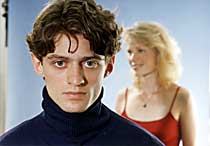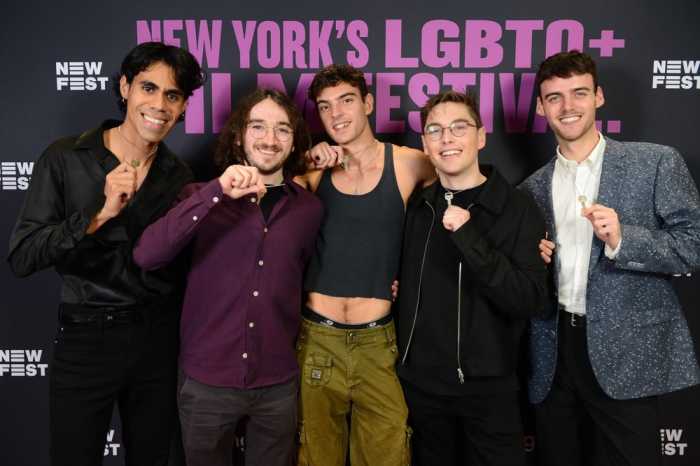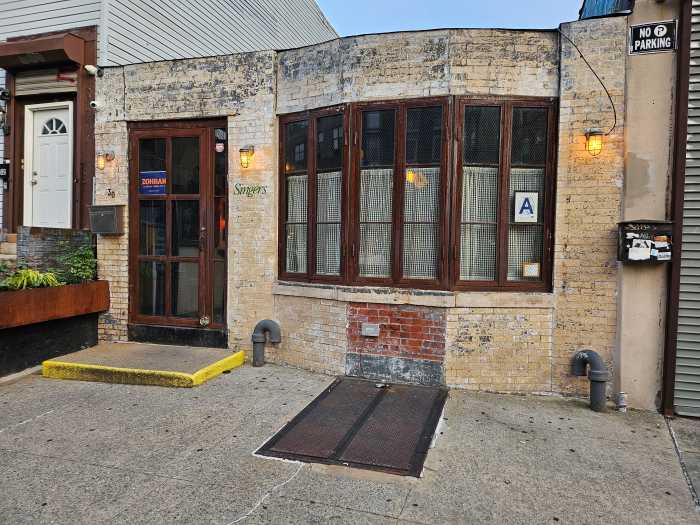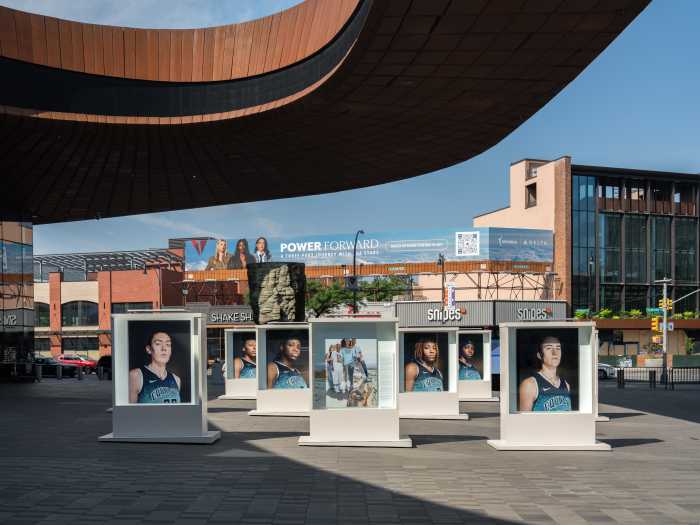When in 1818, Mary Wollstonecraft Shelley wrote her gothic
classic "Frankenstein," what she had in mind was a
parable illustrating what happens when humans attempt to play
God. In fact, the alternative title of the novel is "The
Modern Prometheus."
When Hollywood got hold of the book in 1931, most of the philosophy
was replaced with horror and the sentiment with sensational cinematography.
In the minds of most Americans, Frankenstein’s creature is forever
fixed in the heavily made-up face of Boris Karloff.
Victor Gialanella’s version of "Frankenstein," now
staged by the Heights Players, is a play that is much closer
to Shelley’s original novel. Once again we see Frankenstein’s
creation (sensitively played by Sean Guerin) as a misunderstood
creature, shunned and banished from his home until he turns to
evil in order to bring retribution upon those who misguidedly
created him.
Directed by Bill Wood ("Carnival," "I Hate Hamlet,"
"Great Expectations"), the production has much to its
credit. Jason Unfried as Victor Frankenstein and Guerin as the
creature provide a dramatic contrast in brain vs. inarticulate
brawn. Krista Gillen, as Frankenstein’s fiancée Elizabeth
Lavenza, is a credible English lady to the end.
Costume designers Thomas N. Tyler and Gina Wolff have done a
superb job dressing Frankenstein and his friends and family in
proper attire for the 19th century, from frilly lace dresses
to formal suits with stiff-collared shirts and wide ties.
But the real star of this "Frankenstein" is the set
design by Gary VanderPutten and Gerry Newman. Much of the equipment
was borrowed from Con Edison, and the result is a laboratory
filled with switches, vials and tubes displaying bluish electric
currents. Couple this with strobe lights, gun shots, fog and
smog, and the atmosphere of Frankenstein may amaze and daunt
even the most sophisticated theatergoer.
Indeed, "Frankenstein" was received with such enthusiastic
applause that the Heights Players is considering an unprecedented
second curtain call. This reviewer would like to add her compliments
to the clamor.
"Frankenstein" plays through Sept. 23, Fridays and
Saturdays at 8 pm, and Sundays at 2 pm. Tickets are $10, $8 seniors
and students. The Heights Players theater is located at 26 Willow
Place. For reservations, call (718) 237-2752.
Hysteria made hilarious
The economy may be going down the tubes. The Mets may be totally
out of the running. And your mother-in-law may be coming over
for an extended visit. But in the Gallery Players’ theater in
Park Slope, there is unrestrained laughter.
"The Musical Comedy Murders of 1940," by John Bishop,
starts off as slightly amusing but ends up with side-splitting
scenes so hilarious half the audience has trouble staying in
their seats.
Murder and mayhem abound, but director Bruce Merrill clearly
has his material well under control. That essential timing is
never off, surprise never fails and the actors always look as
funny as they sound.
The plot revolves around the unsolved murders of three chorus
girls, which occurred several years before the action of the
play, and the shenanigans of Nazi saboteurs who have smuggled
themselves into New York.
A group of theater people gathers at the home of Elsa Von Grossenknueten
(Margaret Catov) ostensibly for a backer’s audition to impress
the impresario Marjorie Baverstock (the seasoned comedienne Susan
Faye Groberg), but really to help Grossenknueten expose the serial
chorus girl killer, one of whose victims was Grossenknueten’s
friend. The killer, she believes, is somewhere in her home. But
this is 1940, and the Nazis, unbeknownst to her, are all over.
The question is, who are the Nazis? Helen Wenzel (Yasmine Falk),
the straight-laced, straight-faced and very funny maid, any of
her German relatives, or perhaps even Grossenknueten herself?
And who is the killer of chorus girls? The debonair director
Ken De La Maize (David Keller in a role that was made for him),
the effeminate composer Roger Hopewell (the excellent Joseph
Smith), or perhaps the dedicated lyricist Bernice Roth, a dipsomaniac
given a delightfully funny dignity by Mary Cobra.
One even suspects the Irish cop, Michael Kelly, played by Owiso
Odera, who happens to be a black man. Kelly and the dim-witted
Grossenknueten engage in a charade that would make Abbott and
Costello or Desi and Lucy take notice.
In fact, "The Musical Comedy Murders of 1940" has all
the sight gags, plays on words and double entendres that are
the stuff of which good comedy is made.
The beauty of "The Musical Comedy Murders of 1940"
is that each character is so well rounded and singularly funny
that the audience hates to see any of them leave the stage. Alas,
the plot demands that many of them must die, and one can only
be comforted by the thought that at least they do so in the most
outrageous ways.
Derek Haas and James A. Sturtevant have created a memorable set
with sliding bookcases, secret passages, front doors, closet
doors and hall doors – all perfect for murderers suddenly appearing,
or murders without the appearance of murderers at all. And let’s
not forget the ubiquitous body in the closet.
Without resorting to hyperbole, this reviewer hasn’t laughed
so much at a film or play in 20 years.
"The Musical Comedy Murders of 1940" plays through
Sept. 30, Thursdays, Fridays and Saturdays at 8 pm, Sundays at
3 pm. Tickets are $15 for adults, $12 for seniors and children
under 12. For reservations, call (718) 595-0547.
’Woman Killer’ moves to Brooklyn
"Woman Killer," a new play presented by Crossing Jamaica
Avenue theater company at HERE! Arts Center, opens on a stage
delineated by red poles that form a giant box in front of a large
circle tacked to the back of the stage.
At first, it seemed that the box might represent the narrow limits
of our personal existence, while the circle symbolized the larger
sphere of the world. But as the play progressed and the dialogue
swung from the sordid ("I need $17,000") to the sublime
("I’m so thirsty I can taste my own death") to the
trite ("When I was a kid, the future was a blank page"),
it became distinctly possible that the author was perhaps writing
a parody of some daytime soap opera.
All the elements were there – a wayward son, doting parents,
a bored housewife, anger and perverted sex. But in the end, "Woman
Killer" just wasn’t funny enough. And aside from a few moments
of subdued mirth, one suspects the play is mainly meant to be
taken seriously.
"Woman Killer" was inspired by Japanese classical writer
Monzaemon Chikamatsu’s play "The Woman Killer" and
"The Hell of Oil," originally performed as a Bunraku
puppet play in 1721. The play was based on an actual crime of
that time, a crime whose senseless brutality and inexplicable
nature is reflected in Chikamatsu’s play.
"Woman Killer," which was written by Chiori Miyagawa
and directed by Brooklyn resident Sonoko Kawahara, two Japanese
women who head Crossing Jamaica Avenue, is an effort to fuse
contemporary Western realities with Japanese sensibilities, and
Western aesthetics with influences of traditional Japanese arts.
Their updated version of Chikamatsu’s play is set in the present
and takes place in Brooklyn. It tells the story of how a troubled,
debt-ridden and degenerate son, Clay (Crispin Freeman), destroys
his family and kills his childhood sweetheart, Anne (Hope Salas)
in a psychotic fit. But Miyagawa does not place all the blame
at Clay’s feet of – well, you know. He’s also a victim of pressure
from his family, his promiscuous girlfriend and, of course, society.
Despite its weaknesses, "Woman Killer" is cosmic in
scope and well directed. It showcases some truly excellent acting.
It is nothing less than riveting. What "Woman Killer"
fails to do is move the audience – to tears, to compassion, to
fear even to really caring.
The problem may be in the dialogue, which too often leans toward
the grandiose, or it may be in the stylized nature of the narrative.
But somehow the play seems to be more about ideas than people.
Bunraku puppet theater used chanted narrative recited to the
accompaniment of a three-stringed Japanese lute. It may have
been quite affecting to Japanese sensibilities of the 18th century,
but to the post-Freudian Western mind, it comes off more as a
treatise than a drama.
Nevertheless, "Woman Killer" is the kind of thought-provoking,
original play that cannot easily be dismissed. Although the dialogue
fails to find a consistent tone, it does often strike a note
close to our hearts and our homes. Add to this the stellar acting
of Freeman and the rest of the cast, and "Woman Killer"
is also a play that shouldn’t be missed.
"Woman Killer" plays through Sept. 30, Thursday
through Sunday at 7 pm. Tickets are $15. HERE! is located at
145 Sixth Ave. between Spring and Broome streets in Manhattan.
For reservations, call (212) 647-0202 or visit www.here.org on
the Web.
























